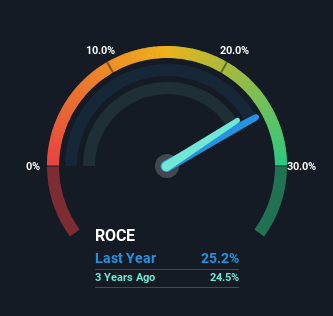- United States
- /
- Professional Services
- /
- NYSE:PAYC
Returns On Capital Signal Tricky Times Ahead For Paycom Software (NYSE:PAYC)
To find a multi-bagger stock, what are the underlying trends we should look for in a business? Typically, we'll want to notice a trend of growing return on capital employed (ROCE) and alongside that, an expanding base of capital employed. Put simply, these types of businesses are compounding machines, meaning they are continually reinvesting their earnings at ever-higher rates of return. Having said that, while the ROCE is currently high for Paycom Software (NYSE:PAYC), we aren't jumping out of our chairs because returns are decreasing.
Return On Capital Employed (ROCE): What Is It?
For those that aren't sure what ROCE is, it measures the amount of pre-tax profits a company can generate from the capital employed in its business. The formula for this calculation on Paycom Software is:
Return on Capital Employed = Earnings Before Interest and Tax (EBIT) ÷ (Total Assets - Current Liabilities)
0.25 = US$450m ÷ (US$3.9b - US$2.1b) (Based on the trailing twelve months to September 2023).
Therefore, Paycom Software has an ROCE of 25%. In absolute terms that's a great return and it's even better than the Professional Services industry average of 12%.
View our latest analysis for Paycom Software

Above you can see how the current ROCE for Paycom Software compares to its prior returns on capital, but there's only so much you can tell from the past. If you're interested, you can view the analysts predictions in our free report on analyst forecasts for the company.
What The Trend Of ROCE Can Tell Us
When we looked at the ROCE trend at Paycom Software, we didn't gain much confidence. Historically returns on capital were even higher at 33%, but they have dropped over the last five years. Although, given both revenue and the amount of assets employed in the business have increased, it could suggest the company is investing in growth, and the extra capital has led to a short-term reduction in ROCE. If these investments prove successful, this can bode very well for long term stock performance.
On a side note, Paycom Software has done well to pay down its current liabilities to 54% of total assets. That could partly explain why the ROCE has dropped. What's more, this can reduce some aspects of risk to the business because now the company's suppliers or short-term creditors are funding less of its operations. Since the business is basically funding more of its operations with it's own money, you could argue this has made the business less efficient at generating ROCE. Keep in mind 54% is still pretty high, so those risks are still somewhat prevalent.
The Bottom Line
In summary, despite lower returns in the short term, we're encouraged to see that Paycom Software is reinvesting for growth and has higher sales as a result. These trends are starting to be recognized by investors since the stock has delivered a 34% gain to shareholders who've held over the last five years. So this stock may still be an appealing investment opportunity, if other fundamentals prove to be sound.
One more thing, we've spotted 2 warning signs facing Paycom Software that you might find interesting.
High returns are a key ingredient to strong performance, so check out our free list ofstocks earning high returns on equity with solid balance sheets.
New: Manage All Your Stock Portfolios in One Place
We've created the ultimate portfolio companion for stock investors, and it's free.
• Connect an unlimited number of Portfolios and see your total in one currency
• Be alerted to new Warning Signs or Risks via email or mobile
• Track the Fair Value of your stocks
Have feedback on this article? Concerned about the content? Get in touch with us directly. Alternatively, email editorial-team (at) simplywallst.com.
This article by Simply Wall St is general in nature. We provide commentary based on historical data and analyst forecasts only using an unbiased methodology and our articles are not intended to be financial advice. It does not constitute a recommendation to buy or sell any stock, and does not take account of your objectives, or your financial situation. We aim to bring you long-term focused analysis driven by fundamental data. Note that our analysis may not factor in the latest price-sensitive company announcements or qualitative material. Simply Wall St has no position in any stocks mentioned.
About NYSE:PAYC
Paycom Software
Provides cloud-based human capital management (HCM) solution delivered as software-as-a-service for small to mid-sized companies in the United States.
Very undervalued with flawless balance sheet.
Similar Companies
Market Insights
Community Narratives


